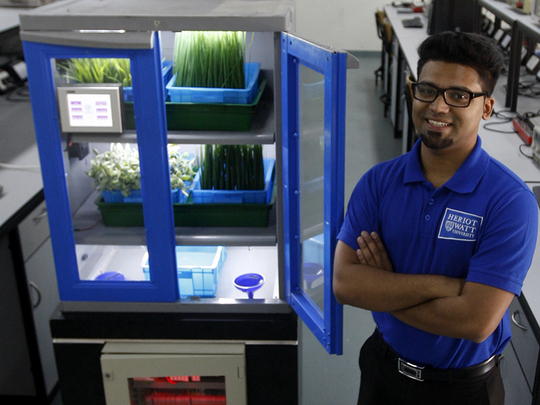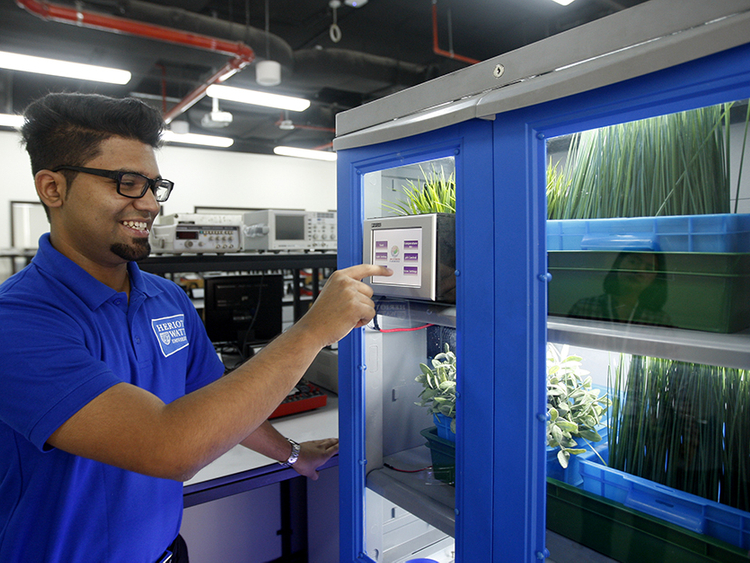
Dubai: You can grow your own herbs and choice of veggies in a cabinet in your kitchen, and it takes very little effort. This is what Dubai-based Rakesh Joe Francy, 22, envisions with his Mini Automated Farming prototype — a three-shelved recycled cabinet where organic herbs and vegetables can be grown — that requires little to no knowledge of gardening skills.
The electrical engineering student bagged second place for his project in the Environment Category of the Phoenix Contact — Xplore 2015 Automation Awards that recently took place in Germany. Francy beat contenders from Japan, China, the US, among others.
“We aim to integrate already available technology with clean modern farming techniques such as hydroponics for people who lack the knowledge to grow plants but have the need to grow plants,” Francy, a student of Heriot-Watt University Dubai Campus, told Gulf News.
“In the UAE, the climatic conditions are very harsh. If someone wants to have a fresh garden in his balcony, it’s eventually going to fail because it’s so harsh out there. So you can have this in your kitchen and just let the plants grow,” he added.
The farming cabinet is a plug and play device. It has three shelves with two tanks each containing a special substrate that act as the “ground” where the seeds will be planted. Using hydroponics — the process of growing plants without soil — the plants receive water and light automatically as programmed in the device from Phoenix Contact.
Francy said every household that wants to grow their own greens at home but has space limitations can do so because the farming cabinet occupies only as much space as a fridge or a dishwasher does. They can grow parsley, mint, coriander, lettuce, tomatoes, chilli, lettuce, and wheatgrass, among others.
“If it’s wheatgrass, it takes just seven days to harvest in my cabinet. I put the seeds and on the seventh day, I can already harvest it and start juicing. Basil takes 15 days; coriander takes 20 days. It varies from plant to plant.”
Francy said his first harvest “brought tears to my eyes because it was so amazing to see.”
But the actual cutting and picking was even better.
“The freshness is so good it’s much better than what we get from the supermarket. When I cut the coriander from the cabinet in my room, my mum smelled it all the way from the kitchen. The texture, smell, and quality of the herbs are improved,” Francy said.
Soori Prashani Kumar, Francy’s professor, tried the produce grown in the cabinet and he said “it tasted very fresh and unique.”
“Whenever we buy vegetables from any market, my wife has to clean them five times just to remove the sand,” said Kumar, Assistant Professor at School of Engineering and Physical Sciences at Heriot-Watt University Dubai Campus.
“This project has tremendous potential especially in this region. The vegetables we consume can now be grown inside the kitchen, that’s the beauty of it. One does not need to know about agriculture because everything is automated,” Kumar said.
The farming cabinet is also water efficient with only approximately seven litres of water needed for a harvest of six types of veggies and herbs for a month.
In terms of power consumption, Francy said the cost had been calculated to be approximately Dh300 per year.
Francy said plans are under way to optimise the design and produce the farming cabinet on a large scale for use in places in need of fresh produce like refugee camps, or in very arid areas.
“In 1984, the Macintosh was made and Steve Jobs believed in developing personal computers for the common man. In 2015, with a similar concept in mind, we are trying to integrate personal farming for the common man,” Francy said.













